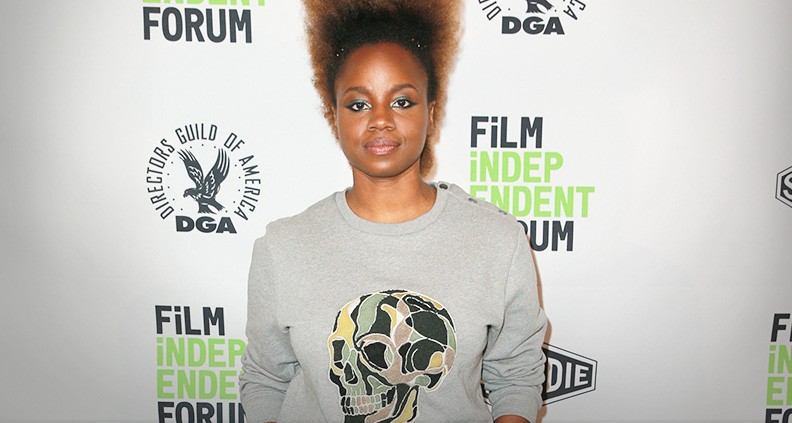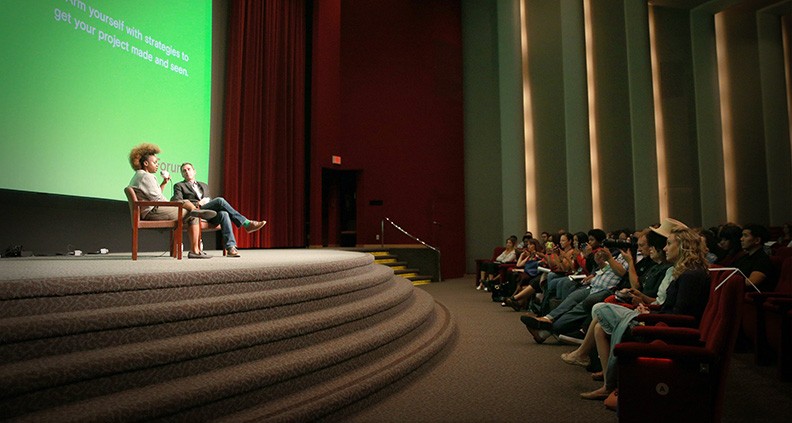Dee Rees Closes Forum with ‘Mudbound’ and Memorable Characters
“I’m not into reading lines—I’m just really into the relationships,” quipped writer/director Dee Rees during Sunday’s second-and-final Film Independent Forum keynote. The Spirit Award winner and former marketing professional spent an informative hour chatting with Film Independent President Josh Welsh about her work and career. An actor’s director (Welsh’s term), Rees gave insight into her unlikely filmmaking journey as well as the memorable characters featured in her three features to date: Pariah, Bessie and the upcoming Mudbound—to be released November 17.
Growing up in the ‘80s, Rees loved the Indiana Jones movies, taping shows off TV and writing short stories. “I was a typical suburban middle-class kid and art felt like a luxury; it felt like an indulgence.” Being a writer seemed at the time like a flaky career choice, so Rees went into business instead, getting her MBA and taking on brand management gigs for companies including Dr. Scholl’s and Colgate Palmolive. But after three jobs in three years, she began to wonder if she had made the right choice.

It was while on probation at her third marketing job that Rees learned about filmmaking. Expecting to be fired anyway, Rees quit her job, applied to NYU and came out as a lesbian. “Whatever it is that you want to do is going to come out. You can’t just put it on the back burner. It’s gonna burst forth.” She applied to two NYU programs: writing and film. She wasn’t accepted into the dramatic writing program and assumed that was the end of it. To her surprise, NYU did accept her application to the film program.
“Get hands-on training,” she advised. “At NYU, everyone gets to shoot their own script. Everyone gets to shoot, everyone gets to light, everyone gets to edit. By the end you’ve gotten your hands on every part of the process.”
Rees’ thesis short Pariah (eventually expanded into her debut) was slow to gain attention, but was eventually selected to play at the 2011 LA Film Festival, where it won the Audience Award. “The LA Film Festival was the first time our film didn’t get ghetto-ized in the gay section, so like ‘gay shorts’—they put it in with other shorts and it won!”
Rees’ directorial style is very much centered on character relationships. Rather than having actors run lines, she gives them exercises to explore their characters’ relationships with one another. For Pariah, she put lead actors Adepero Oduye and Pernell Walker in butch attire and sent them to Dave and Buster’s. For the HBO biopic Bessie, she invited Queen Latifah and Mo’Nique to her office t0 tell road stories. “I just like to do these workshops where the actors are talking to each other, creating a shared history together. To me, if the shared relationship is there then the lines will come.”
For Rees, subtext is critical. “I just get excited about characters. I’m always trying to go for the brokenness; I’m always trying to go for the cracks. I’m always trying to go for the complications.” For Bessie, Rees was intrigued by the juxtaposition of fame and loneliness, injecting her own take on Bessie Smith and Ma Rainey. “Queer black women who were self-sufficient—who had their mobility, who had their sexuality. We’re still talking about them today. As a filmmaker, you’re always trying to find the thing you really want to talk about and then inject it into the subject at hand.”

Rees’ latest, the 1940s-set drama Mudbound, premiered at this year’s Sundance and will be available on Netflix (and in theaters!) in November. Featuring six characters with heavy voiceover, Rees pointed out that the script –adapted by Virgil Williams—closely follows the format of the novel upon which it’s based, with each chapter voiced by a different character. “The thing I liked about [author Hilary Jordan’s] writing is the internal monologue. I think the things that people say to themselves are sometimes more interesting than the things they say to others.”
The emphasis on monologue, coupled with strategic casting from casting directors Billy Hopkins and Ashley Ingram (Ingram handled the film’s local background actors, which Rees said was as vital as the casting of the leads), gives Mudbound its rich tapestry of unique voices and interesting faces, an especially important facet for a period film. “I needed people who look like they’ve never seen a goji berry in their lives,” laughed Rees, referring to the inauthenticity of the typical LA/NY thespian pool.
With three successful features under her belt, Rees has had disappointments too: a blind script deal that went unproduced; a Nashville project that was killed a year before ABC’s Nashville came out. In response to an audience question about the mental toughness it took to persevere through those challenges, Rees cited her foremost calling as a writer. Writing meant that she always had something to do next. And because she was creating her own projects, if one thing didn’t go she moved on to another. In that way she avoided the devastation of only having one thing—which, if it fails, that’s it.
“I’m not saying there weren’t days I was depressed and crying. But just figure out what your treat is, and find small ways to reward yourself. Celebrate every tiny victory—have a beer, have a cupcake or whatever that reward is that you like. They add up and you need it when you get the big no’s and reversals. Things change constantly, just always have another thing coming.”
Watch the entire panel below or on our YouTube channel:
The 2017 Film Independent Forum took place from October 20-22 at the Directors Guild of America in Los Angeles.
To see more from this year’s panels and events, follow us on Twitter and Facebook. Not a Member of Film Independent yet? Become one today.
The 2017 Film Independent Forum is supported by Premier Sponsors Directors Guild of America and SAGIndie with additional support from Principal Sponsor Universal Pictures and Supporting Sponsors D’Alessio Law Group and the Netherlands Film Fund